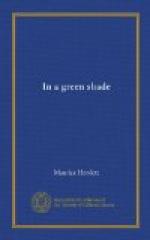I have a plant whose seed is much more beautiful than its flower. By the way, I have two, for the Spindle Tree is in seed, which has a quite insignificant blossom. But the plant I mean is a wild peony, which I dug up in a brake on the slopes of Helikon. It is a single white whose flower lasts, perhaps, three days. It makes a large seed-pod, which burst a short time ago, and revealed blue-black seeds sheathed in coralline forms of the most absolute vermilion. You could see them fifty yards away. It seems to have no purpose in life but to pack the seeds—or perhaps, they are beacons for the birds. I took pains to be beforehand with the birds, having no desire to see Greek peonies in my neighbours’ gardens. The seeds are safely bestowed, though their fate has not been Jonah’s. There’s a spinney of elder-trees in the combe of my hermitage, which, I am told, was planted entirely by magpies. And I suppose it was wood-pigeons who planted two ilex trees on the top of the Guinigi tower in Lucca; and some bird or other, once more, which is answerable for a fine fig-tree growing in the parapet of the bridge at Cordova, in no soil whatsoever. It was loaded with fruit when I saw it. But fig-trees are like poets; if you want them to sing you must torture their roots. The parallel wobbles, but will be understood.
DORIAN MODES
Being known in these parts for a friendly soul, and trusted, moreover, I have fallen into the position among the peasantry which the parson used to hold, and does still when he takes the trouble to qualify for it. If I can’t always tell them what to do I may be able to put them in the way of the man who can. One learns how to make a dictionary of life as one gets on in it. Another use which they can have of me: I can tell them how to put their requests or demands. They have no sense whatever of a written language.
I must not betray confidences, or I could relate some curious matters on this head. I know, for instance, a farmer who is worth a couple of hundred thousand at the least, and who can neither write nor read. He has learned somehow a cross between a scratch and a blot which is accepted as a signature to cheques—but no more than that. And there is no harm in saying that I often need an interpreter. I had a case the other night when a man I know brought in a friend for consultation—a youth of the round-headed, flaxen, Teutonic type, rather rare here, who came from a village still more remote from the world than this one. Not one word of his fluent and frequent speeches could I understand. It was largely a question of intonation I believe—but there it was.




